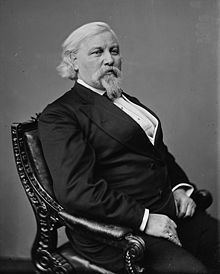Marshall Jewell
Marshall Jewell (* 20th October 1825 in Winchester , Cheshire County , New Hampshire ; † 10. February 1883 in New Haven , Connecticut ) was an American politician of the Republican Party .
Life
After attending public school, Jewell apprenticed to his father to learn the tanning trade . He later switched to the telegraph industry ; in Akron ( Ohio ), he was head of a telegraph offices. His marriage to Esther Dickinson had two children.
politics
Jewell was one of the earliest members of the newly formed Connecticut Republican Party. In 1867 he ran unsuccessfully for the Connecticut Senate ; also in the following year, when he first ran for the office of governor for this state, Jewell suffered a defeat. In 1869 he then prevailed against the Democratic incumbent James E. English .
After a year in office, he lost the next election against his predecessor. The change to the post of governor continued in 1871, when English won the election, but a committee of inquiry discovered tampering and awarded the victory to Jewell. He then also won the election in 1872, before he no longer ran after a total of three terms in office.
In 1873 Marshall Jewell took on a completely different task when US President Ulysses S. Grant appointed him US envoy to Russia . After only seven months, however , he left Saint Petersburg again. At home, President Grant assigned him the post of Postmaster General . He was a member of the cabinet until 1876.
Marshall Jewell was one of the leading figures in his party. In 1876 he was originally a candidate to succeed the outgoing President Grant. Ultimately, he ran for the Republican National Convention as vice-presidential candidate behind Rutherford B. Hayes ; with 86 votes, however, he ended up only in third place behind William Almon Wheeler (366) and Frederick T. Frelinghuysen (89). Hayes and Wheeler won the next election and moved into the White House.
Jewell remained an important man with the Republicans, however. From 1880 until his death in 1883 he chaired the Republican National Committee .
Web links
- Marshall Jewell in the National Governors Association (English)
- Marshall Jewell in the Miller Center of Public Affairs of the University of Virginia (English)
- Marshall Jewell in the database of Find a Grave (English)
| personal data | |
|---|---|
| SURNAME | Jewell, Marshall |
| BRIEF DESCRIPTION | American politician |
| DATE OF BIRTH | October 20, 1825 |
| PLACE OF BIRTH | Winchester , New Hampshire |
| DATE OF DEATH | February 10, 1883 |
| Place of death | New Haven , Connecticut |




